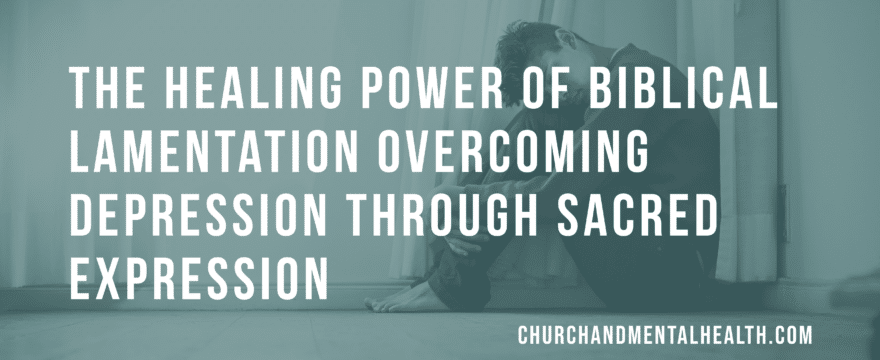Depression is a widespread mental health condition that affects millions of individuals worldwide. While there are many secular therapeutic approaches to managing depression that are evidence-based practices clinicians utilize, one often overlooked resource for healing can be found within Scripture. The practice of biblical lamentation, a form of sacred expression and grieving, offers a powerful tool for those seeking to improve their mental health and find solace amidst the darkness of depression.
Lamenting Is Not Just Something For Old Testament
Biblical lamentation is a genre of prayer or song found throughout the Bible, particularly in the book of Psalms. It is an expression of deep anguish, grief, and sorrow in the face of personal or communal suffering. We see it from David, Isaiah, Moses, Habakkuk, and maybe most famously in Scriptures from Job. Jeremiah did it in his own book but he is the author of a book specifically titled Lamentations of this very topic.
Lamentations often follow a distinct structure: an expression of pain and distress, a cry for help or deliverance, and a statement of trust and praise. By engaging in the act of lamentation, individuals are encouraged to confront their emotions, acknowledge their pain, and ultimately find comfort in their relationship with God. It is no different today when we attend the funerals of those we deeply loved, individuals who struggle with severe depression or trauma, and those who feel hopeless and helpless to the point of suicide.
Validating Emotional Experience
Depression often leaves individuals feeling isolated and trapped in their own emotions. The practice of biblical lamentation serves as a reminder that they are not alone in their suffering. The Psalms, for example, contain numerous expressions of despair, confusion, and anguish, demonstrating that even the faithful wrestled with similar emotions. By engaging with these texts, individuals can find solace in the realization that their emotional experiences are valid and have been shared by others throughout history.
Encouraging Honest Dialogue
One of the unique features of biblical lamentation is its emphasis on honest dialogue with God. Lamentations provide a safe space for individuals to pour out their deepest struggles, doubts, and questions. David in the Psalms cries out in pain and asked God for relief. Elijah and Jonah went so far in their stories to plead God to simply kill them than deal with the wickedness and injustice, even if their short-sightedness is apparent to us. This process of lamentation allows for raw and authentic communication with God, fostering a sense of intimacy and trust. By expressing their pain and concerns openly, individuals may experience a profound sense of release and relief, creating space for healing and renewed hope.
Fostering a Sense of Hope and Support
Although lamentations often begin with expressions of distress and despair, they almost always conclude with statements of trust, praise, and hope. Many times this includes communal or individual worship. This movement from despair to hope showcases the transformative power of lamentation. Engaging in the practice of lamentation can shift one’s focus from the overwhelming weight of depression towards a more optimistic outlook. By acknowledging pain and seeking solace in a higher power, individuals may find comfort and renewed strength to face their struggles.
By sharing laments with others, individuals can create a sense of community and solidarity, fostering support and understanding. This communal aspect of lamentation can be particularly beneficial for individuals struggling with depression, as it helps them realize they are not alone and encourages mutual support in their journey toward healing.
We Can Learn To Grieve With God
Depression can be a taxing and isolating journey, but biblical lamentation offers a transformative path toward healing and renewal. By engaging in this sacred practice, individuals can validate their emotional experiences, foster honest dialogue with God, find hope amidst despair, and build a supportive community. The power of lamentation lies in its ability to provide solace, comfort, and renewed strength to those struggling with depression. As individuals pour out their hearts and souls, they can find solace in the timeless words of the Bible and discover that, even in their darkest moments, there is hope for a brighter tomorrow.
